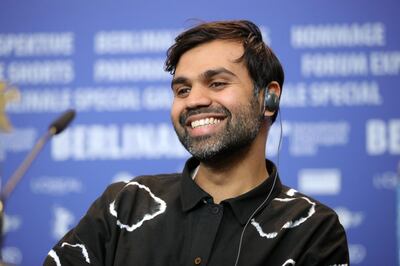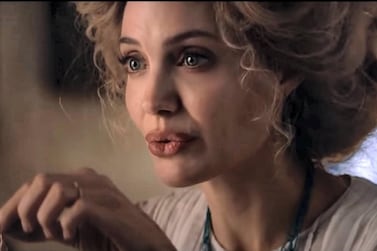"The things we chase are the things that are essentially hollow," Riz Ahmed tells The National. "The things that really matter are the things that we run away from all the time."
Exploring this truth forms the heart of the British actor and musician's latest film, Mogul Mowgli, that he produced, co-wrote and stars in.
While the premise of the film sounds all too familiar – a musician on the cusp of superstardom is having an identity crisis caused in part by being the child of Pakistani immigrants growing up in the West – this second-generational tale has never been depicted on screen in such a visceral style.
Mogul Mowgli veers away from the tropes of the identity crisis drama in which a child of immigrants struggles with double consciousness after growing up in the West. These tales all too often use a Romeo & Juliet-style love story to define the culture clash. Instead, Mogul Mowgli strives for a more in-depth, layered investigation into the realities of having a Pakistani background growing up in Britain, with stunning results.
"It's less about Islam says this, and more about that classic father-and-son tension, where each generation has to dance on the grave of the last one, until eventually we realise what we are standing on also defines us," explains the actor, 37. "The film is more about legacy and inheritance."
Speaking of his character, Zed, Ahmed says that the singer has spent his life seeking the answer to the question, who am I? “But if you actually want to know who you are, you've got to stop and really look at yourself in the mirror, you need to understand that you're part of a whole," Ahmed says.
That moment of reflection is forced upon Zed. On a trip to his family home, Zed is diagnosed with an autoimmune disease, a condition where the immune system attacks its own body. "It's really about that identity crisis playing itself out on a molecular level," says Ahmed.
In doing so, the drama explores the relatively young – and still disputed – field of transgenerational trauma, a psychological term which asserts that trauma can be transferred to future generations. The film doesn't come down one way or another on the science, but uses this concept as a jumping point to investigate Zed's psychology and the traits he has inherited.
"Zed is a musician who wants to leave behind this great artistic legacy, but he hasn't really understood what legacy he has inherited," Ahmed says. "That inherited legacy is one of trauma, but it's also one of this amazing cultural heritage, like qawwali music.
"Zed is basically chasing all these mirages, but actually what he's looking for is inside of him. It's part of his DNA, part of his childhood and his memory. It's about this journey within, really," adds the actor, acknowledging the concept is "slightly abstract".
Putting these ideas on screen has been a personal project for Ahmed. The title comes from the song Half Moghul Half Mowgli by the Swet Shop Boys, the hip-hop group in which Ahmed raps under his Riz MC moniker. The film even starts with Zed performing the song, which Ahmed wrote describing the polarity he feels when trying to balance his fame with representing his culture.
"When you write something, it's weird," he says about the personal nature of the project. "I heard [filmmaker] Noah Baumbach talk about this recently – every time you write a story, you take two pieces of flint from your life and knock them together to see what sparks. You take elements of your own experience and you extrapolate them, heighten then, so it's very personal in terms of the place it's coming from."
To help him bring this story to the screen, Ahmed approached director and co-writer Bassam Tariq. "Bassam and I are both artists who have spent a lot of our lives trying to answer the question of who am I through our work."

Tariq was going through his own existential crisis when Ahmed came calling. His film These Birds Walk, about a humanitarian's efforts to help a runaway boy in Karachi, Pakistan, won the Black Pearl Award for Best Documentary Film at the Abu Dhabi Film Festival in 2013, and a clutch of other awards. Yet two years later, Tariq was contemplating giving up directing. "It was a great experience, I learnt a lot, but I wasn't sure that is where I wanted to be. I started a butchery in New York."
Ahmed had seen These Birds Walk at a film festival and made contact with Tariq, who had just welcomed his first child. "Riz and I started speaking, talking about the possibility of collaborating. Then things started kicking off in Riz's career with [miniseries] The Night Of. It was exciting, and so I started looking at if there was a way back into film," he says.
"I started to talk about some of these things dealing with ancestral trauma, and the Partition of India, and Riz said maybe there's a way for us to divide these ideas that we want to work on."
They started meeting up whenever their work schedules would allow, swapping ideas and writing together. They took a week-long trip to Pakistan together with the hope of shooting there, before realising it would be too difficult from a production standpoint. Tariq visited Ahmed's family in London. "My family mirrors his family so much," he says.
And that's how the shape of Mogul Mowgli started to emerge.
"We realised that there was a deeper conversation that we're having with the diaspora," says Tarqi, "and in our own experiences with being here in the West."
Mogul Mowgli is playing at the BFI London Film Festival until Tuesday, October 13







